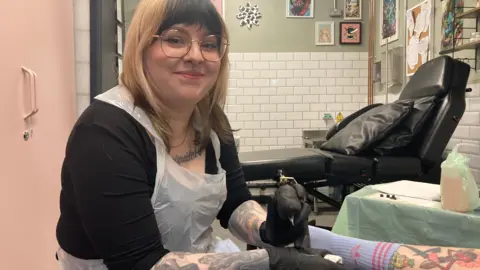 BBC
BBCThere are fears tattoo artists will have to increase their prices as Wales becomes the first part of the UK to introduce new rules for artists.
The Welsh government rules mean practitioners will have to meet stricter hygiene and safety standards in order to be given a licence, which they’ll have to renew every three years.
It follows concerns from medics about the risk of serious infections.
“I imagine the prices of tattoos are going to go up to accommodate this,” said Kim Thomas, a tattoo artist in Newport.
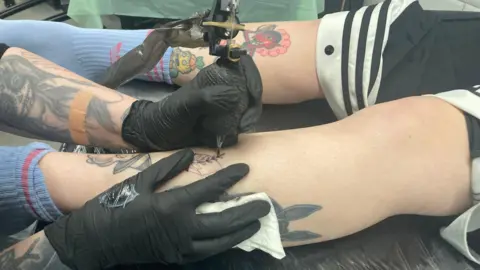
Kim, who has been a tattoo artist for eight years and runs her own Mourning Star Tattoo parlour, said the industry had become “much more mainstream now” and agrees more safety regulation is needed.
“There are people who are tattooing illegally a lot more, because it’s a lot easier to acquire the machines, the inks, and everything else involved in the process,” she said.
“I do think [the legislation] is a good thing overall, because it means that everyone has to be of the same standard in order to work in the industry.
“But the downside is the financial cost.”
What are the new tattoo rules?
The new scheme comes into effect on Friday, meaning more than 4,000 individual practitioners across Wales now face paying £203 for a licence.
More than 2,000 premises will also require their own certification, costing £385, and Kim says it’s inevitable that some costs will have to be passed on to customers.
“As the owner of a tattoo studio, not only do I have to insure myself and do the extra course, but I then have to license myself and the studio,” she said.
“Which means that when we’ve got to do this every three years, it’s going to cost quite a lot.”
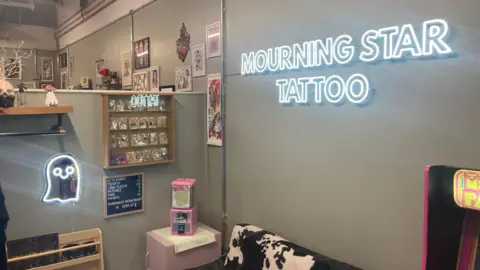
Tattoos are becoming more popular in the UK, with one in four people telling a YouGov poll in 2022 that they had one.
The survey of more than 2,000 people also found that women (29%) were more likely than men (22%) to have a tattoo, with over a third of people between 25-54 having been inked.
Alice Harding, 33, from Bridgend got her first tattoo as a teenager, and says people’s attitudes have changed over the years.
“When I first started you didn’t find that many women with tattoos, so you’d comments off people like ‘why are you ruining your body’,” she said.
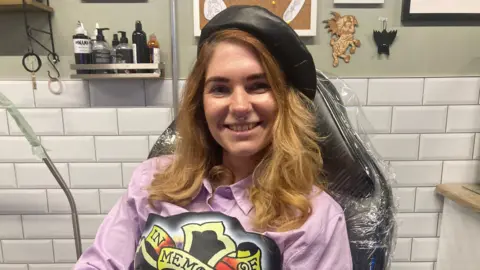
“I was told I couldn’t have jobs because I had tattoos.
“It’s a lot more accepting now I’d say… especially as a woman, there are loads of women out there with tats now rocking it.”
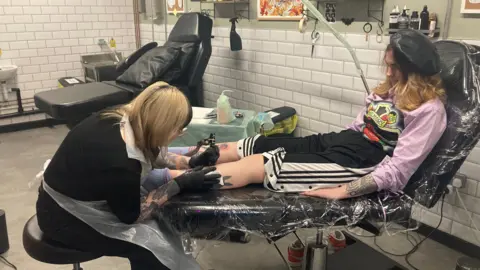
When do the new tattoo rules come in?
The new rules are the final phase of changes under the Public Health (Wales) Act 2017, to improve standards of infection prevention and control, but were delayed by Brexit and the Covid pandemic.
Although the changes come into effect immediately, the government expects it to be “a number of months” before many will be fully registered.
Keith Reid, deputy chief medical officer for Wales, said the rules, which also cover those having acupuncture, electrolysis, piercing, and semi-permanent makeup procedures, would give people an “extra level of assurance around safety”.

Why are the tattoo rules changing?
“We’re concerned about skin infections, which can be a problem around tattooing,” he said.
“We’re also concerned about the risk of blood-borne infections, which can be a risk with anything that pierces the skin.
“So the purpose of the regime is to reduce the risk to the public, and make it safer for the public who wish to undergo these procedures.”
He added that fees had been set “at a very modest level”, and that renewal every three years was a “reasonable compromise”.





